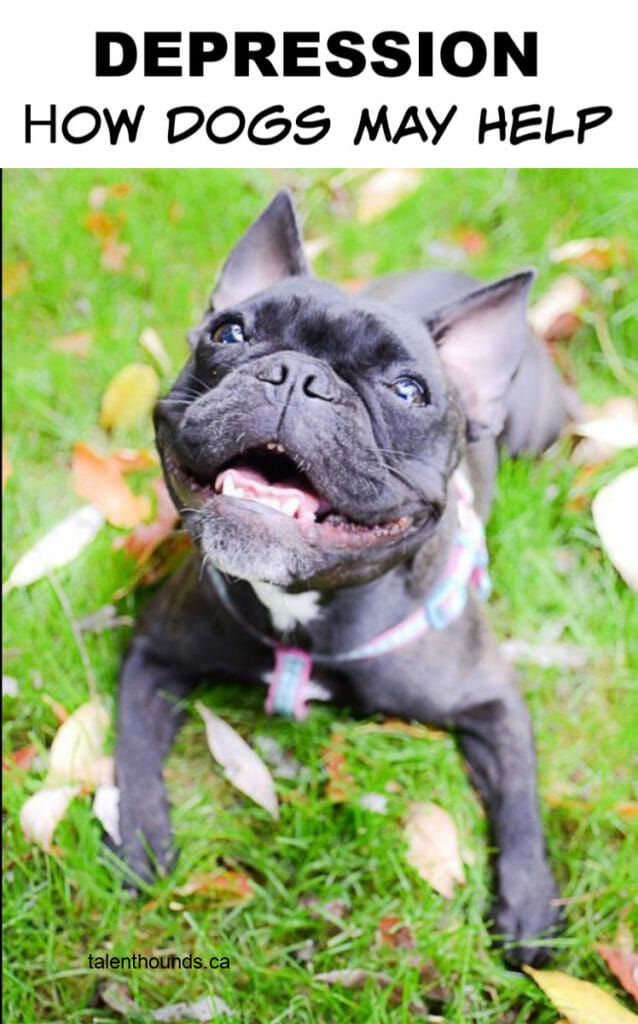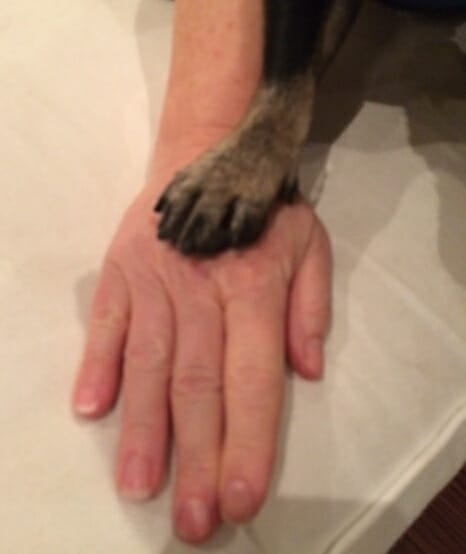
Depression Can Affect Us All
At some point in their life, most people will either suffer symptoms of depression or be affected by someone else suffering with the disease. I have had several close family members and friends with severe depression. For our Talent Hounds documentary Dogs Make a Difference and my friends and family, I have done extensive research on how a dog can help with depression.
According to the National Institute of Mental Health, depressive disorders affect approximately 18.8 million American adults age 18 or older or about 9.5% of the U.S. population each year.
15% of the population in most developed countries suffers from severe depression reported World Health Organization (WHO) on BBC-Online. A percentage of those affected by depression who do not receive help may commit suicide.
Seasonal Blues Are Common
January can be a dismal month for many people, especially in northern countries with short days and cold climates where people may suffer from winter Seasonal affective disorder (SAD) or get out less.
This is compounded by the fact that the festive season can actually be a high pressure, lonely time for many.
Going back to work or school in January can also leave people feeling low. While some of us may feel glum at the end of winter holidays and start of the year, for some people these thoughts can spiral into serious depression.
Dr Cliff Arnall of Cardiff University has calculated that Monday 22nd January is ‘the worst day of the year’ using six factors: weather, debt, time since Christmas, time since failing new year’s resolutions, low motivational levels and the feeling of a need to take action.
Read more from Dr. Arnall HERE
The Human Animal Bond
Studies have shown that animals, particularly dogs, can reduce tension and improve moods in humans. Alongside treatment, pets can help people who suffer with mild to moderate symptoms of depression find comfort.
Experts in medicine, psychiatry, veterinary studies and epidemiology studies came together to contribute to PAWSitive InterAction’s “A Scientific Look At The Human Animal Bond.” Throughout the paper, they presented scientific research and case studies that validate the therapeutic effects and benefits of human-animal relationships.
Dr Stanley Coren shared some of the scientific evidence of the benefits of puppies and dogs in our documentary series – see details below.
According to Dogs For Depression, dogs help reduce the symptoms of depression because they are naturally pack animals who “instinctively form close bonds with other members of their pack or family.” They offer support, loyalty and affection to others, which makes them perfect companions for humans.
The healing power of pets has been scientifically proven. According to Dr. Alan Beck, director of the Center for the Human-Animal Bond, School of Veterinary Medicine at Purdue University, animals offer an array of health benefits.
“The companionship of animals decreases loneliness and stimulates conversation,” Beck says. “By encouraging touch and giving humans a sentient creature to care for, interaction with animals stimulates physical reactions that are very necessary and important in humans.”
Please note – we are not doctors and dogs are not a replacement for medical or expert attention and are certainly not right for everyone. Please seek emergency help immediately if you are suffering from severe depression or have suicidal thoughts.
Ways having a Dog may help with Depression:
Love
Unlike relationships with friends and family, the love from a pet is uncomplicated, nonjudgmental and unconditional. They are there for you with a warm welcome and a wagging tail. With a pet, especially a velcro dog like my pug Kilo, you are never alone. They don’t care how you look and often seem to sense your moods and respond accordingly.
“Pets offer an unconditional love that can be very helpful to people with depression,” says Ian Cook, MD, a psychiatrist and director of the Depression Research and Clinic Program at UCLA.
In a survey conducted by the American 4 Pet Products Manufacturers Association in 2001, 94% of people indicated that companionship, love, and company are the top benefits of owning a dog. We found similar results in our surveys and contests.

Mental Health
Many studies have examined the effect the human-animal bond has on mental health.
According to a 1998 study published in the Delta Society’s “Healthy Reasons to Have a Pet,” in which 241 patients underwent animal-assisted therapy sessions. The researchers studied how the animals reduced the anxiety level of varied hospitalized psychiatric patients.
Group A patients participated in animal-assisted therapy with a dog while Group B participated in regular therapeutic sessions without animal assistance. In conclusion, the study found that the animal-assisted therapy sessions had a significant positive effect on patients. The dog’s presence brought a significant reduction in anxiety for patients who suffered from mood and psychotic disorders.
Responsibility
Experts suggest that the responsibility of owning a pet can help those that are feeling down. Having a dog means adding a focus on another being that needs you and a daily schedule to your life. One friend of mine who suffers from depression and chronic pain told me that caring for her dog is her reason to get up in the morning.

Physical Activity
Studies around the world have shown that people with dogs do get out and walk more than those without. This makes sense to me as I know Kilo forces me to take breaks from the computer and get exercise every day. Physical activity is good for you and your pet’s physical and mental health.
Having a dog can help to “stimulate exercise, encourage laughter, and facilitate social contact”. Dr. Alan Beck, director of the Center for the Human-Animal Bond explains that “these benefits add up to an improved sense of well being.”
Social Life
More physical activity means more outings, and pets are perfect natural icebreakers. Even having a quick chat with other dog walkers in the park or on the street or at a training facility or event will help to gently push you to get more social contact.
For some people, especially those with PTSD or autism, social situations or even leaving the house can cause anxiety or a rise in blood pressure. Having a canine companion whose got your back can help ease these feelings.
Affection and Touch
Research has found that owning or caring for a dog can help lower blood pressure and stress hormones while boosting levels of feel-good chemicals in the brain. Dogs can fulfill the basic human need for affection and touch. In our Puppies Rock and Dogs Make A Difference episodes, Dr Stanley Coren explains that there can be an immediate release of chemicals like endorphins and oxytocin in the brain when you pat, cuddle, look at and/or smell a cute puppy or dog that are similar to taking anti-depressants or holding a human baby. I know I can not help smiling and feeling special when Kilo looks up at me lovingly with his big brown eyes and his cute baby face. I relax when I stroke his soft fur around his ears.
People and animals have lived close to one another for centuries. Only recently have we been exploring all the talents of dogs. We are really fascinated by the way dogs can mentally and physically help seniors, people in hospitals, children with autism, people with PTSD or other anxiety disorders, students with stress about exams, and children learning to read.
It is very inspirational to see the work dogs like Bocker, Gizmo, Surf Dog Ricochet, Chopper, Zoe, Smiley, an many others have done in our Dogs Make Difference Episode and we hope to explore this area more.
Many programs like NSD, Dog Guides Canada, R.E.A.D and ReCHAI (the Research Centre for Human Animal Interaction), have been working on facilitating hands-on programs, in which dogs help people suffering or in need. It is very inspirational to see the work these individuals and dogs have done using the natural human-animal bond to help heal.
Pets aren’t for everyone and are not a substitute for medical or expert help and therapy but rather a possible complement. If you or a loved one are suffering from depression, don’t assume that getting a dog is the right choice or easy solution. Dogs are a big lifetime commitment and careful research is always the best option.
Try our breed library if you are thinking about adopting a dog.
Has your dog helped you?
Share your positive stories in the comments below along with any tips, suggestions or comments about the human-animal bond.


Interesting post, that smiley face would cheer anyone up!
Thanks- we agree! Have a great week Teresa. XS
A very well researched post with great information. I have never been without at least one dog in my life and it is painful to even imagine life without them especially in winter
.
Great post! And it’s not just canines. My beautiful feline Athena has really helped me with my depression.
A wonderful, informative, and compassionate post. Thank you.
I would also add that a furfriend is vital during the grieving process, which is certainly different from depression but can sometimes feel the same. I (Tootsie’s mom) also suffer from chronic pain and adhesive capsulitis, and Tootsie is vital is making me feel human and in giving care to my soul.
I love all the reasons you list that our furfriends can help.
Thank you, again.
What valuable information shared in this post. When Harley does his therapy work, sometimes he will decide who he wants to spend time with. And usually that person is truly in need of some TLC As they interact with him, you can almost see the pain leave from their faces. Pets have such unconditional love – it is amazing how well they connect with humans. Thanks for this post!
I agree that our dogs keep us healthy and happy. It’s hard to be sad when you wake up to their smiling little faces.
Mr. N definitely cheers me up and the kids love seeing him too.
My dogs have certainly cheered me up when I’m feeling blue! And helping out at the animal shelter also makes me feel good!
What a great post! I agree, all my furry pals keep my spirits up even in the toughest times! Thanks for sharing such an informative post!
Everyday I come home and no matter what kind of day I had, it gets infinitely better when I see those little wiggle butts coming my way! They remind me to focus on the important things, let go of the things that don’t matter, and give lots of hugs.
I love this post, Talent Hounds! We pet owners know how important our pets are to us and how much joy they give us, but it is important to also consider how pets can help others.
Great post – we agree! Both dogs and CATS make wonderful companions!
Great article and so true. Pets really do help!
A very valid comment from my lovely friend Emmy – we are very excited about research to date but would hate anyone to think pets are a replacement for medical help or that they bring instant happiness for everyone: “Hi Susan. Good blog post. I tried to comment several times on the blog itself, but was told I got the wrong CAPCHA code. Here’s my comment: I’ve dealt with varying levels of depression for more than 40 years. Pets can help, but mental illness is a relentless adversary. Good doctors and medications are vital; pets are a good supplement.”
I actually recently did a review on a book that had an amazing story about a dog helping her get through anxiety and depression. Dogs can do amazing things.
ღ husky hugz ღ frum our pack at Love is being owned by a husky!